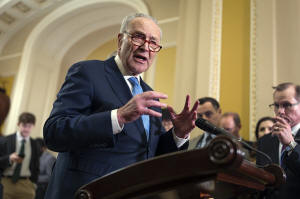Senate Republicans approve budget framework, pushing past Democratic
objections after all-night vote
 Send a link to a friend
Send a link to a friend
 [February 21, 2025]
By LISA MASCARO, KEVIN FREKING and MATT BROWN [February 21, 2025]
By LISA MASCARO, KEVIN FREKING and MATT BROWN
WASHINGTON (AP) — Republican senators pushed a $340 billion budget
framework to passage early Friday, chugging through an all-night session
and Democratic opposition in a step toward unleashing money the Trump
administration says it needs for mass deportations and border security
that top their agenda.
The hours-long “vote-a-rama” rambled along in a dreaded but crucial part
of the budget process, as senators considered one amendment after
another, largely from Democrats trying to halt it. But Republicans used
their majority power to muscle the package to approval on a largely
party-line vote, 52-48, with all Democrats and one GOP senator opposing
it.
“What we're doing today is jumpstarting a process that will allow the
Republican Party to meet President Trump's immigration agenda,” Senate
Budget Committee chair Lindsey Graham, R-S.C., said while opening the
debate.
Graham said President Donald Trump's top immigration czar, Tom Homan,
told senators that the administration's deportation operations are “out
of money” and need more funding from Congress to detain and deport
immigrants.
With little power in the minority to stop the onslaught, Democrats
instead used the all-night debate to force GOP senators into potentially
embarrassing votes — including the first one, on blocking tax breaks to
billionaires. It was turned back on procedural grounds. So were many
others.

“This is going to be a long, drawn-out fight,” Senate Democratic Leader
Chuck Schumer of New York warned. Hours later, Schumer said it “was only
the beginning” of what could become a months-long debate.
The package is what Republicans view as a down payment on Trump’s
agenda, part of a broader effort that will eventually include
legislation to extend some $4.5 trillion in tax breaks and other
priorities. That's being assembled by House Speaker Mike Johnson in a
separate budget package that also seeks up to $2 trillion in reductions
to health care and other programs.
Trump has preferred what he calls one “big, beautiful bill,” but the
White House is open to the Senate’s strategy of working on the border
package first, then turning to tax cuts later this year.
As voting began, the president signaled his go-ahead, posting a thank
you to Senate Majority Leader John Thune “and the Republican Senate, for
working so hard on funding the Trump Border Agenda.”
Republican Sen. Rand Paul of Kentucky cast the lone GOP vote against the
framework.
What’s in the Senate GOP package
The Republican Senate package would allow up to $175 billion to be spent
on border security, including money for mass deportation operations and
building the U.S.-Mexico border wall, in addition to a $150 billion
boost to the Pentagon and about $20 billion for the Coast Guard.
But there won't be any money flowing just yet, as the process has
several steps ahead. The budget resolution is simply a framework that
sends instructions to the various Senate committees — Homeland Security,
Armed Services, Judiciary — to hammer out the details. Everything will
eventually be assembled in another package, with another vote-a-rama
down the road.
Sen. John Barrasso, R-Wyo., the No. 2-ranking Senate Republican, said
GOP lawmakers are acting quickly to get the administration the resources
they have requested and need to curb illegal border crossings.
“The budget will allow us to finish the wall. It also takes the steps we
need toward more border agents,” Barrasso said. “It means more detention
beds. ... It means more deportation flights.”
Republicans insist the whole thing will be paid for, rather than piled
onto debt, with potential spending cuts and new revenues.
The committees are expected to consider rolling back the Biden
administration’s methane emissions fee, which was approved by Democrats
as part of climate change strategies in the Inflation Reduction Act, and
hoping to draw new revenue from energy leases as they aim to spur
domestic energy production.
[to top of second column]
|

Senate Minority Leader Chuck Schumer, D-N.Y., speaks to reporters
after a closed-door strategy meeting at the Capitol in Washington,
Wednesday, Feb. 19, 2025. (AP Photo/J. Scott Applewhite)

One amendment that was accepted after several hours of debate was
actually a Republican effort to fend off criticism that the package
would be paid for by cutting safety net programs. The amendment from
Sen. Dan Sullivan, R-Alaska, said Medicaid and Medicare would be
strengthened during the budget process.
Democrats brought a slew of amendments
First up from Democrats was a vote to prevent tax breaks for
billionaires — an amendment that was repeated in various forms
throughout the night.
Democrats argue that the GOP tax cuts approved in 2017 flowed to the
wealthiest Americans, and extending them as Trump wants Congress to
do later this year would prolong the giveaway. Even though the
billionaire amendments failed, they picked up some Republican
support. Sen. Susan Collins of Maine voted for several of them, and
Sen. Josh Hawley of Missouri voted for another.
Schumer launched a strategy earlier this week to use the budget
debate to focus on both the implications of the tax policy and the
Trump administration's Department of Government Efficiency, which is
slashing across the federal government.
It's a better approach for Democrats than arguing against tougher
border security and deportations, which divides the party.
All told, senators processed almost three dozen amendments on
reversing DOGE cuts, protecting federal workers from being fired,
ensuring U.S. support for Ukraine as it battles Russia and others.
Sen. Patty Murray of Washington, the top Democrat on the Senate
Appropriations Committee, said the single biggest driver of the
national debt since 2001 has been a series of Republican-led tax
cuts.
“And you’ll never guess what our Republican colleagues on the other
side of the aisle are focused on right now, nothing to lower the
cost of eggs, it’s actually more Republican tax cuts,” Murray said.
She called the budget plan a “roadmap for painful cuts to programs
families count on each and every day, all so they can give
billionaires more tax cuts.”

Congress is racing itself
The budget resolution is setting up what's called the reconciliation
process, which used to be rare, but is now the tool often used to
pass big bills on party-line votes when one party has control of the
White House and Congress, as Republicans do now.
But Republicans are arguing with themselves over how to proceed. The
House is marching ahead on its “big, beautiful bill,” believing they
have one chance to get it right. The Senate views its two-bill
strategy as more practical, delivering on border security first,
then turning to taxes later.
Budget rules allow for passage by a simple majority vote, which is
key in the Senate, where it typically takes 60 votes to break a
filibuster on big items. During Trump’s first term, Republicans used
the reconciliation process to pass GOP tax cuts in 2017. Democrats
used reconciliation during Joe Biden's presidency to approve
COVID-19 relief and the Inflation Reduction Act.
Trump appears to be stirring the fight, pitting Republicans in the
House and Senate against each other to see which one delivers
fastest.
___
Associated Press writer Darlene Superville contributed to this
report.
All contents © copyright 2025 Associated Press. All rights reserved |